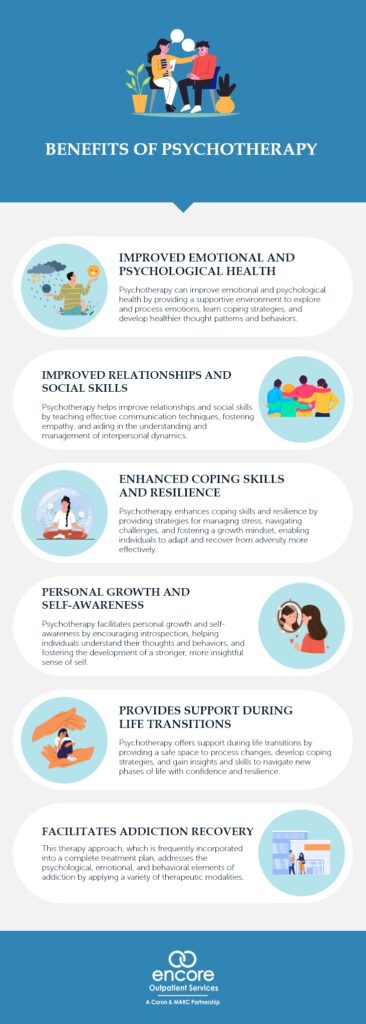Our dedication lies not just in treating symptoms but in addressing the root causes, offering a holistic approach that integrates the best of therapeutic practices with the warmth of community support.
Benefits of Psychotherapy

Psychotherapy, commonly referred to as talk therapy, is a method of treating mental health challenges by helping individuals understand their feelings, thoughts, and behaviors. It involves structured conversations with a trained therapist to explore and resolve problematic beliefs, feelings, relationship challenges, and behaviors. This therapeutic process can employ various approaches, such as cognitive-behavioral therapy (CBT), psychodynamic therapy, interpersonal therapy, humanistic therapy, art therapy, music therapy, nature-based therapy, or animal-assisted therapy, each tailored to meet the individual’s specific needs. By fostering a safe, confidential, and empathetic environment, psychotherapy aims to empower individuals to overcome challenges, improve mental well-being, and enhance their overall quality of life. Its effectiveness is well-documented in treating a range of challenges, from everyday stress and relationship problems to severe mental health conditions. Engaging in psychotherapy can be a pivotal step in embarking on a journey toward personal growth and emotional resilience.
Here is a list of some of the most notable benefits of psychotherapy:
Improved Emotional and Psychological Health
One of the primary advantages of psychotherapy is its effectiveness in treating common mental health conditions such as depression and anxiety disorders. Through psychotherapy, individuals learn to understand and manage their symptoms, leading to improved mood and reduced anxiety levels.
Psychotherapy is also instrumental in addressing more complex mental health challenges like post-traumatic stress disorder (PTSD) by providing strategies to help cope with and process traumatic experiences. It also plays a crucial role in the treatment of eating disorders, obsessive-compulsive disorder (OCD), borderline personality disorder (BPD), bipolar disorder (BP), panic disorder, and various phobias, offering a path to wellness and a better quality of life.
Additionally, psychotherapy contributes to enhanced emotional regulation. Patients develop skills to identify, understand, and manage emotions more effectively. This improved emotional intelligence often leads to better stress management, enabling individuals to handle daily life challenges with greater resilience.
Engaging in psychotherapy treatment can also help improve a person’s self-esteem and self-acceptance, fostering a more positive self-image and confidence. It equips individuals with tools to break negative thought patterns and replace them with healthier, more constructive ones.
Improved Relationships and Social Skills
Psychotherapy significantly contributes to enhancing relationships and social skills. It provides individuals with tools and techniques to improve their interpersonal relationships.
Psychotherapies, such as family therapy, narrative therapy, and interpersonal psychotherapy, focus on enhancing communication skills that enable individuals to express their needs and emotions constructively. It also helps individuals understand others’ perspectives better, fostering empathy and improving interactions within personal and professional relationships.
Psychotherapy teaches strategies for resolving conflicts in a healthy and assertive manner without resorting to damaging behaviors. By improving communication and understanding, psychotherapy aids in building stronger, more fulfilling relationships with family, friends, and colleagues.
For those struggling with social anxiety, psychotherapy can provide techniques to manage anxiety symptoms, leading to more confident and comfortable social interactions. Psychotherapy contributes significantly to a more fulfilling social life and improved interactions with those around us. It not only aids in resolving internal conflicts but also significantly improves one’s ability to maintain and nurture healthier and more satisfying relationships.

Enhanced Coping Skills and Resilience
Psychotherapy is instrumental in teaching enhanced coping skills that are crucial for managing stress, trauma, and everyday challenges, thereby fostering resilience. Certain psychotherapy approaches include relaxation methods, time management strategies, and cognitive restructuring to alter stress-inducing thought patterns. By learning these skills, individuals become better equipped to handle daily stressors.
For individuals grappling with trauma, psychotherapy offers a supportive and safe space to process and understand their experiences. Techniques such as exposure therapy and eye movement desensitization and reprocessing (EMDR) are particularly effective. They assist individuals in confronting and working through traumatic memories, significantly mitigating their long-term psychological impact.
In addition, psychotherapy addresses the complexities of everyday life by teaching problem-solving and decision-making skills. These skills are vital in managing everyday challenges more efficiently, promoting a balanced approach to life’s demands. Learning to set realistic goals and prioritize tasks forms a core component of this strategy.
Central to the benefits of psychotherapy is the development of resilience – the capacity to recover quickly from difficulties. This resilience is fostered through a growth mindset, where challenges are viewed as opportunities for learning and self-improvement rather than being seen as an insurmountable obstacle.
Personal Growth and Self-Awareness
Psychotherapy serves as a transformative journey that leads individuals toward greater self-awareness, personal growth, and a profound understanding of their thoughts, feelings, and behaviors. Through various therapeutic approaches, such as psychodynamic therapy, humanistic therapy, and cognitive-behavioral therapy, individuals are encouraged to delve into their past experiences, childhood dynamics, and belief systems. This exploration facilitates insights into the root causes of their current thoughts and behaviors, fostering a deeper understanding of themselves.
The therapeutic relationship also plays a crucial role in promoting self-awareness. Interacting with a trained therapist provides individuals with a unique opportunity to receive feedback, challenge distorted perceptions, and explore alternative perspectives. The therapist acts as a guide, assisting individuals in recognizing patterns of thinking or behaving that may hinder personal growth and self-awareness.
In addition to exploring the past, psychotherapy emphasizes the present moment. Mindfulness-based approaches encourage individuals to stay attuned to their thoughts and emotions in real time. This heightened awareness enhances self-understanding and enables individuals to make conscious choices in response to their experiences.
Provides Support During Life Transitions
Psychotherapy is crucial in providing support and guidance during major life changes or crises. It offers individuals a safe and confidential space to navigate the challenges that often accompany such significant transitions. Whether it’s a career change, loss of a loved one, relocation, or other life-altering events, the therapeutic approaches utilized in psychotherapy can be instrumental in helping individuals cope, adapt, and find meaning in these experiences.
Major life changes can bring about a range of emotions, including anxiety, grief, uncertainty, stress, or excitement. Therapists create a nonjudgmental and empathetic environment in which people can express and process their emotions, gradually assisting them in making sense of their feelings and behaviors. These mental health professionals also assist individuals in reshaping their perspectives on life transitions. By exploring and challenging negative thought patterns or irrational beliefs linked to the change, individuals can develop a more balanced and realistic view of the situation.
Psychotherapeutic interventions such as psychodynamic therapy, CBT, interpersonal therapy, and supportive therapy are effective in assisting individuals in navigating major life changes, managing stress, and developing coping skills to adjust to new situations.
Facilitates Addiction Recovery
Psychotherapy plays a vital role in the treatment of substance use disorders (SUD) and co-occurring disorders. It offers individuals the necessary tools, support, and insight to facilitate addiction recovery. This therapeutic approach, which is often integrated into a comprehensive treatment plan, addresses the psychological, emotional, and behavioral aspects of addiction.
One essential function of psychotherapy in addiction treatment is to explore and address the underlying factors contributing to substance use. Therapists use techniques like cognitive-behavioral therapy, dialectical behavior therapy, psychodynamic therapy, or motivational interviewing to help individuals understand the root causes of their addictive behaviors, including identifying triggers, managing cravings, examining past trauma, promoting healthier decision-making, and supporting long-term recovery. These psychotherapies are often used in combination with other treatments to provide comprehensive care for individuals with substance use disorders.
Fewer Sick Days and Medical Problems
The connection between mental and physical health is a critical aspect of overall well-being, and improvements in mental health through psychotherapy sessions often positively impact physical health. This mind-body connection can result in fewer sick days and a reduction in medical problems.
Psychotherapy effectively reduces stress, which is known to have a significant impact on physical health. Chronic stress can weaken the immune system, making the body more susceptible to illnesses. By managing stress, individuals can improve their immune response, leading to fewer medical problems. As your mental health improves, individuals often make healthier lifestyle choices. This can include better dietary habits, increased physical activity, and improved sleep patterns. These changes contribute to better physical health and reduce the risk of conditions like obesity, heart disease, and diabetes. Studies have also shown a correlation between mental health disorders and chronic physical illnesses. Chronic illnesses can contribute to symptoms of depression or anxiety and vice versa.
Psychotherapy can help in managing these mental health disorders, thereby reducing the risk or severity of related physical health complications. These mental health improvements can enhance the regulation of the autonomic nervous system, which controls bodily functions like heart rate and digestion. Better regulation can decrease physical symptoms, such as gastrointestinal distress or heart palpitations.
How to Get Started With Psychotherapy
Engaging in psychotherapy can be a positive step toward improving your mental health and overall well-being. Here is some practical advice to help you get started with psychotherapy treatment:
- Identify Your Needs and Goals – Take time to reflect on your reasons for seeking therapy and identify specific concerns or challenges you want to address. This clarity will help you have effective communication with potential therapists.
- Understanding Psychotherapy Styles – Familiarize yourself with different therapy styles (such as CBT, DBT, or psychodynamic therapy) to understand what might suit you best. Some therapists offer an integrative approach, combining elements from various styles.
- Research and Referrals – You can seek referrals from your primary care physician, friends, or family members who have undergone psychotherapy. Consider the therapists’ expertise, experience, and approach, and choose someone that aligns with your needs.
- Check Credentials and Specializations – Ensure that the therapists you consider are licensed and have the appropriate credentials. Look for specialists in the condition you’re dealing with, such as anxiety, depression, substance use disorder, or family therapy.
- Contact Potential Therapists – Reach out to potential therapists to inquire about their services, availability, and whether they are accepting new patients. Many therapists offer an initial consultation, which can be a good opportunity to see if they’re a good fit for you.
- Prepare for the First Session – Before your first session, think about your goals for therapy and any questions you might have. Be ready to discuss what you hope to achieve through therapy.
- Commitment to the Process – Remember that psychotherapy is a process that requires commitment and active participation. It’s normal to feel unsure or nervous at the beginning, but with time, psychotherapy can be a profound tool for personal growth and well-being.
By following these steps, you can start your journey with psychotherapy, taking a proactive step towards better mental health.
If you or someone you love is seeking psychotherapy for conditions ranging from substance use disorders to mood disorders, anxiety disorders, grief and loss, trauma, or challenges with attachment and self-harm, Encore Outpatient Services offers a comprehensive and personalized approach. Our highly skilled medical providers are experienced in a diverse array of therapeutic techniques, including mindfulness and meditation, breathwork, yoga, psychodrama, art and music therapy, systemic therapy, and nature-based therapy. At Encore, we understand that each individual’s journey is unique, which is why we offer flexible session frequencies, ranging from daily to weekly, particularly focusing on intensive individual work in the initial phase to develop an efficient and effective therapy experience and tailored treatment plan. Take the first step towards healing and empowerment; reach out to Encore Outpatient Services today to begin your journey to recovery and wellness with the support of our dedicated team and enhance your quality of life.
Let Us Support You On Your Recovery Journey!
Copyright 2026 Encore Outpatient Services | All Rights Reserved



